Moudle4 Home alone词汇短语句型精讲 课件(共55张PPT)
文档属性
| 名称 | Moudle4 Home alone词汇短语句型精讲 课件(共55张PPT) |  | |
| 格式 | pptx | ||
| 文件大小 | 13.5MB | ||
| 资源类型 | 教案 | ||
| 版本资源 | 外研版 | ||
| 科目 | 英语 | ||
| 更新时间 | 2021-07-21 08:16:27 | ||
图片预览


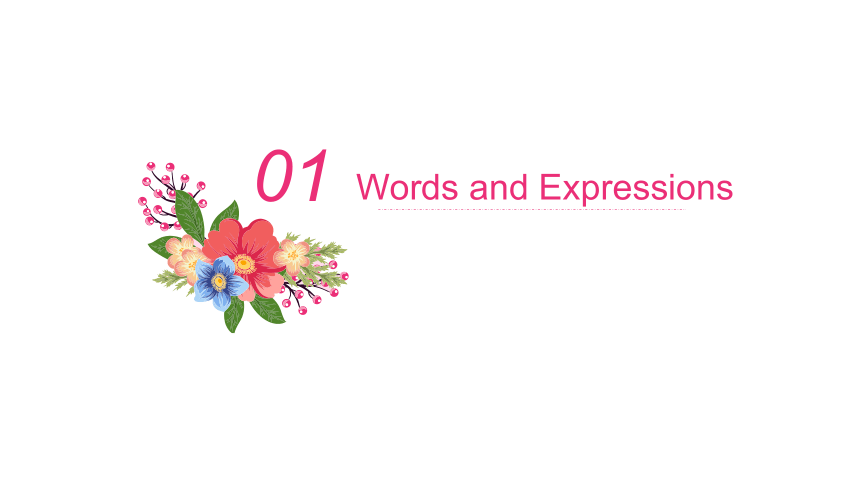
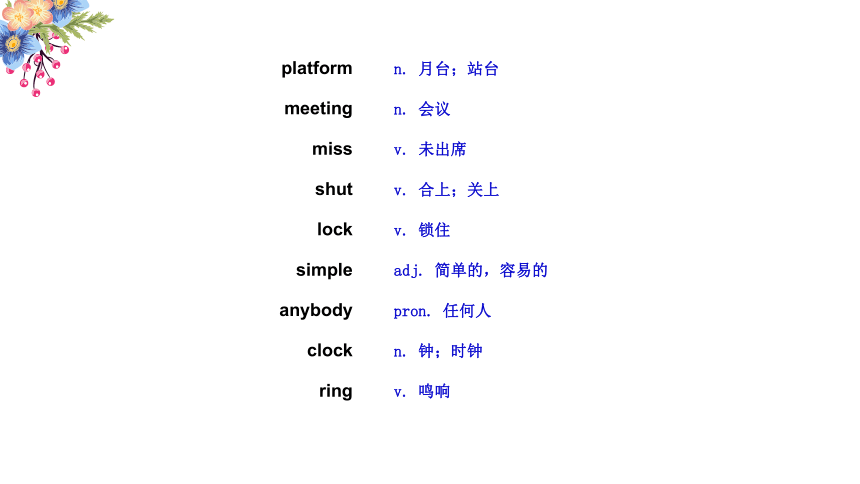
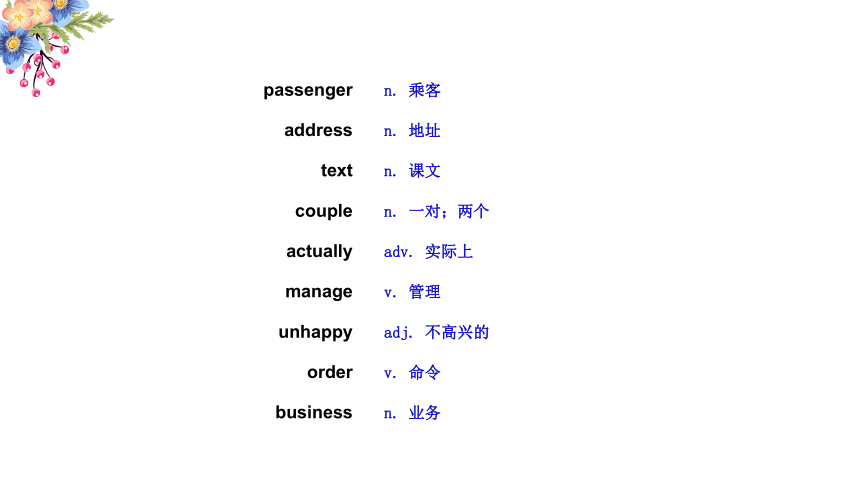

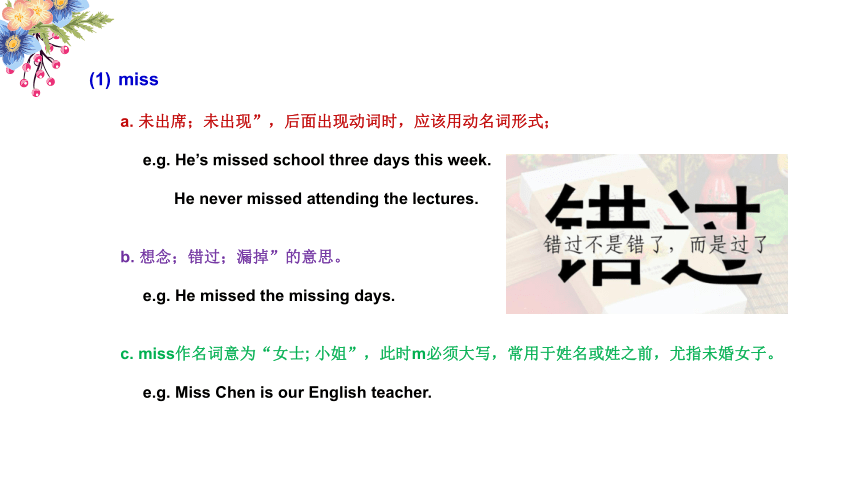
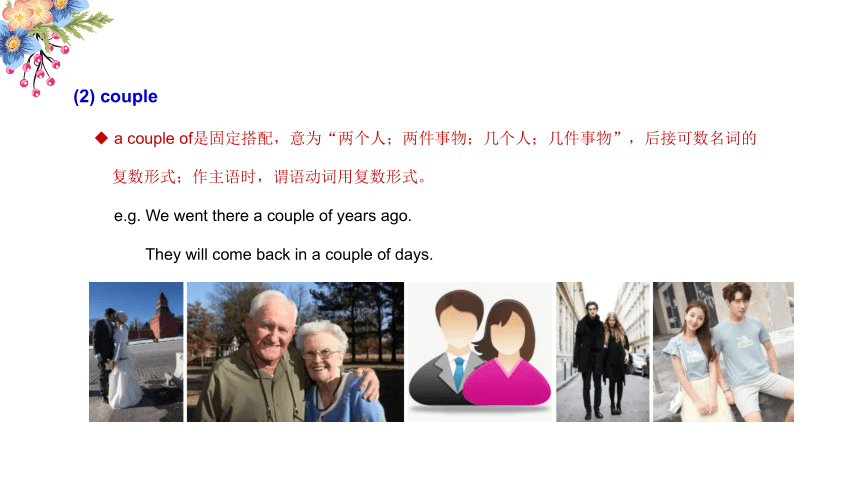

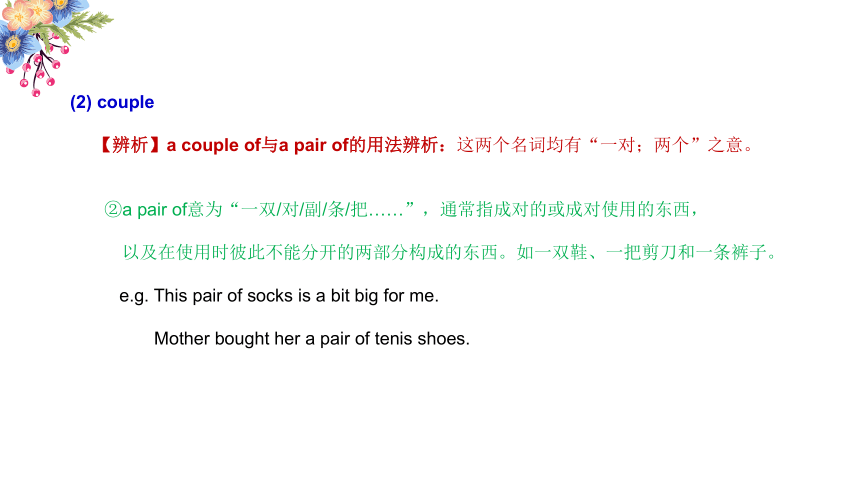
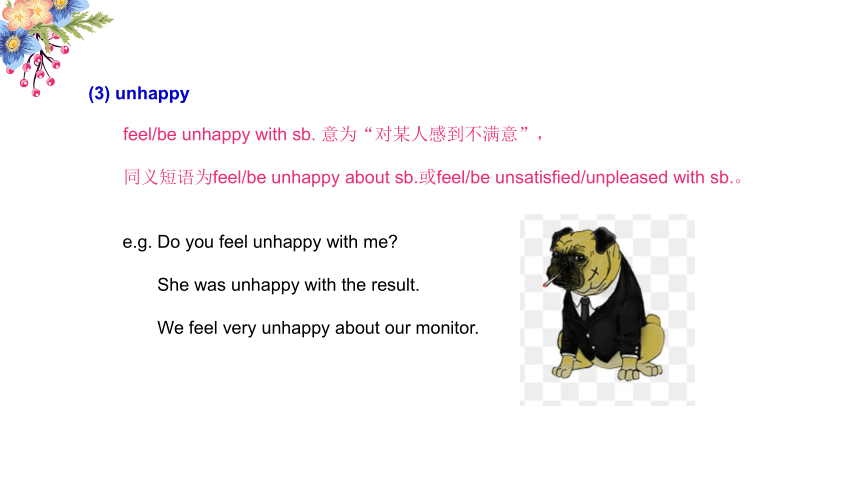
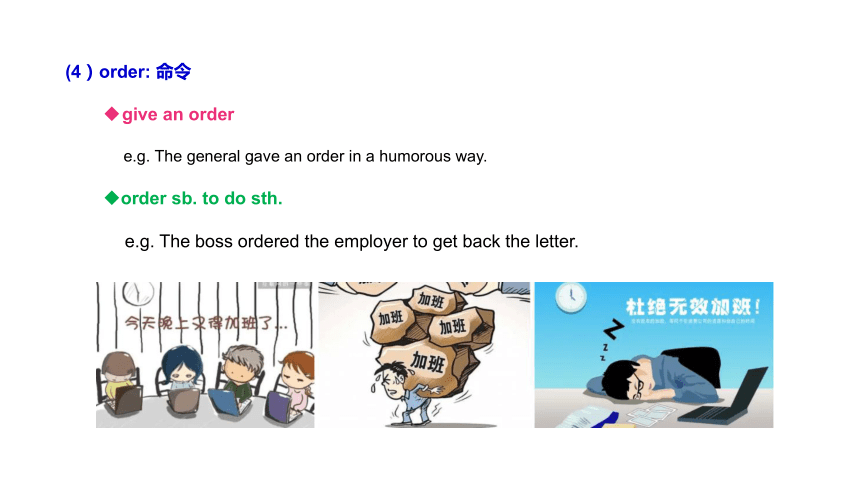
文档简介
Module 4
Home alone
外研版9年级上册
词法荟萃讲解
Words and Expressions
单元关键句型讲解
Key Structures
CONTENTS
Exercises
单元练习讲解
01
Words and Expressions
platform
meeting
miss
shut
lock
simple
anybody
clock
ring
n. 月台;站台
n. 会议
v. 未出席
v. 合上;关上
v. 锁住
adj. 简单的,容易的
pron. 任何人
n. 钟;时钟
v. 鸣响
passenger
address
text
couple
actually
manage
unhappy
order
business
n. 乘客
n. 地址
n. 课文
n. 一对;两个
adv. 实际上
v. 管理
adj. 不高兴的
v. 命令
n. 业务
sofa
snack
midnight
empty
unable
burn
cup
task
n. 沙发
v. 点心
n. 午夜
adj. 空的
adj. 不能够
v. 燃烧
n. 杯子
n. 任务
miss
a. 未出席;未出现”,后面出现动词时,应该用动名词形式;
e.g. He’s?missed?school three days this week.
He never?missed?attending the lectures.
b. 想念;错过;漏掉”的意思。
e.g. He missed the missing days.
c. miss作名词意为“女士; 小姐”,此时m必须大写,常用于姓名或姓之前,尤指未婚女子。
e.g. Miss Chen is our English teacher.
(2) couple
a couple of是固定搭配,意为“两个人;两件事物;几个人;几件事物”,后接可数名词的
复数形式;作主语时,谓语动词用复数形式。
e.g. We went there a couple of years ago.
They will come back in a couple of days.
(2) couple
【辨析】a couple of与a pair of的用法辨析:这两个名词均有“一对;两个”之意。
① a couple of意为“两个人;两件事物;几个人;几件事物”,
常指同类事物中的任意两个或几个,不一定是成对的或成双使用的。
e.g. She has a couple of friends at school.
I have a couple of offers from Hollywood.
(2) couple
【辨析】a couple of与a pair of的用法辨析:这两个名词均有“一对;两个”之意。
②a pair of意为“一双/对/副/条/把……”,通常指成对的或成对使用的东西,
以及在使用时彼此不能分开的两部分构成的东西。如一双鞋、一把剪刀和一条裤子。
e.g. This pair of socks is a bit big for me.
Mother bought her a pair of tenis shoes.
(3) unhappy
feel/be unhappy with sb. 意为“对某人感到不满意”,
同义短语为feel/be unhappy about sb.或feel/be unsatisfied/unpleased with sb.。
e.g. Do you feel unhappy with me?
She was unhappy with the result.
We feel very unhappy about our monitor.
(4)order: 命令
give an order
e.g. The general gave an order in a humorous way.
order sb. to do sth.
e.g. The boss ordered the employer to get back the letter.
(5) unable: adj. 不能够
be unable to do sth.意为“不能做某事”,反义短语是be able to do sth.意为“能够做某事”;
unable是形容词,意为“无能的”,是able的反义词,不能作定语。
e.g. He was unable to finish homework on time.
I am unable to swim though my father swims very well.
text message
a couple of
turn off
be worried about
on business
wake up
hand in
all day long
短信
一对;两个
关掉;关闭
担忧
出差
醒来
上交
整天
careful with
look after
make sure
plenty of
so...that...
advise sb. to do sth.
be about to do sth.
send sb. sth.
send sb. a text message
小心(对待);注意
照顾;照看
确保;设法保证
许多;大量;充分的
如此……以至于……
建议某人做某事
即将做某事
把某物发送给某人
给某人发短信
have a good trip
a bit
feel unhappy with sb.
be/become bored with
leave sb. alone
come true
have fun
wake up
hurry to do sth.
旅途愉快
稍微;有点儿
对某人感到不满意
对……感到无聊/厌倦
让某人独自待着
实现;成真
玩得高兴
醒;醒来
赶紧做某事
ask sb. for sth.
help sb. with sth.
tidy up
depend on
plan to do sth.
say goodbye to sb.
go hungry
be pleased to do sth.
see sb. off
向某人要某物
帮助某人做某事;在某事上帮助某人
收拾;整理
依靠;依赖;取决于
计划做某事
向某人告别
挨饿
很乐意做某事
送别某人
be busy doing sth.
get ready
fight with sb.
in a hurry
by accident
later on
hear sb. doing sth.
take away
put sb. in danger
point out
out of reach of sb.
忙于做某事
准备好
和某人争吵
匆忙地
偶然地;意外地
后来
听见某人在做某事
拿走;带走
把某人置于危险中
指出
某人够不到的范围。
turn off
turn off意为“关掉;关闭”。常指关掉家电、收音机、水龙头等。
其反义词是turn on意为“打开”。该短语是“动词+副词”构成的短语。
如果它的宾语是代词(it, them等)要放在“动词+副词”中间,如果它的宾语是名词既可以放在“动词+副词”的中间也可以放在动词和副词的后面。
e.g. You must turn off the lights when you leave the room.
The TV is on. Don’t forget to turn it off when you go out.
turn off
【拓展】与turn有关的短语:
turn on打开;turn off关闭;
turn up调高;开大;出现;
turn down关小;调低;turn in上交;
turn into变成;turn away转过脸去;
turn back原路返回;turn round转身;
turn about转过身来;turn out结果是;
turn over移交,翻过来。
be worried about
be worried about(强调状态)意为“担心”,同义短语为worry about(强调动作)。
worry是动词,意为“担心,焦虑,苦恼”,worried是形容词,意为“担心的,焦虑的”。
e.g. You don’t need to worry about him.
Don’t worry about/be worried about me, mum.
They worry about/are worried about the bad weather.
Parents are always worried about their children.
Every time the exam is over, I’ll be worried about the result.
on business: 出差
on business是固定短语,意为“出差”,常常用作状语。
介词on在此处表示为达到某一目的而从事某项工作,多用于旅行、出差。
business是名词,意为“工作;生意”。
e.g. He is away on business.
David came to Beijing for the first time on business.
wake up: 醒来
wake up意为“醒;醒来”,不是及物动词短语,其后不能接宾语。
e.g. I usually wake up at 6:30 in the morning.
I didn’t wake up until I heard the alarm clock.
hand in: 上交
hand in是固定短语,意为“上交;提交”,指把物品上交,反义短语是hand out,把物品“分发”出去。
该短语是“动词+副词”构成的短语。如果它的宾语是代词(it, them等)要放在“动词+副词”中间;
如果它的宾语是名词既可以放在“动词+副词”的中间也可以放在动词和副词的后面。
e.g. Please hand in your homework on time.
hand in: 上交
【拓展】与hand有关的短语:
hand back交还;
hand down流传;传递;
hand on传递;
hand on to转交;
hand up举手;
hand out散发;分发;
hand sth. to sb.把某物递给某人;
hand over移交。
02
Key structures
So am I意为“我也是”,so代替上文提到的情况。
“So+be动词/助动词/情态动词+主语”表示自己与前一个人的情况相同或同意前一个人的说法,意思是“某人(主语)也是如此”。
be动词/助动词/情态动词要与前面句子的谓语在形式、时态上保持一致,与本句主语在人称和
数上保持一致。
e.g. He can swim, and so can I.
Joe was a little upset, and so was I.
He has been ill, and so has his wife.
So am I, but I can’t miss two weeks of school. 我也是(很遗憾),但是我不能两周不上课。
【辨析】“so+ be动词/助动词/情态动词+主语”与“so+主语+ be动词/助动词/情态动词”的用法辨析:
①“so+ be动词/助动词/情态动词+主语”表示前面所述肯定情况同样适用于后者,意为“某
人(主语)也是如此”,前后两句的主语不是同一人。在口语交际中,可转化为“宾格代
词+too”。
e.g. He goes to school by bike every day. So do I.
Neil left just after midnight, and so did Jack.
So am I, but I can’t miss two weeks of school. 我也是(很遗憾),但是我不能两周不上课。
【辨析】“so+ be动词/助动词/情态动词+主语”与“so+主语+ be动词/助动词/情态动词”的用法辨析:
②“so+主语+ be动词/助动词/情态动词”表示对前面所述情况加以确认,意为“某人(主语)
的确如此”, 前后两句的主语是同一人。
e.g. ---- He likes the car. 他喜欢那辆小汽车。 ---- So he does. 他确实喜欢。
Tom says you work hard, so you do, and so does he.
So am I, but I can’t miss two weeks of school. 我也是(很遗憾),但是我不能两周不上课。
【辨析】“so+ be动词/助动词/情态动词+主语”与“so+主语+ be动词/助动词/情态动词”的用法辨析:
【拓展】
表示与上文所述否定情况相同时,应该用句型“Neither+ be/助动词/情态动词+主语”结构。
e.g. Mary isn’t outgoing, neither am I. 玛丽不外向,我也不(外向)。
So am I, but I can’t miss two weeks of school. 我也是(很遗憾),但是我不能两周不上课。
careful 是形容词,意为“仔细的;认真的;小心的”,在句中作表语或定语。其用法如下:
① be careful with sth. 意为“小心(对待)某物;对某事物小心”。
e.g. Please be careful with my glasses.
② be careful in doing sth. 意为“小心/仔细做某事”。
e.g. He’s careful in reading every sentence.
Be especially careful with the door. 特别要注意家门。
careful 是形容词,意为“仔细的;认真的;小心的”,在句中作表语或定语。其用法如下:
③ be careful to do sth. 意为“小心做某事”。
e.g. He’s careful to read every sentence.
④ be careful+that 从句。意为“小心……”。
e.g. Do be careful (about) what you say.
⑤ be careful of/about意为“注意;当心,留意”。
e.g. I hope you’ll be more careful of/about your health.
Be especially careful with the door. 特别要注意家门。
I can look after myself, although it won’t be easy for me. 我能照顾好自己,尽管那对我来说不那么容易。
look after意为“照顾,照看;照管”,后跟名词或代词作宾语,同义短语为take care of。
e.g. Please look after the baby for me for a while, will you?
My mother is ill. I have to look after/take care of her at home.
I can look after myself, although it won’t be easy for me. 我能照顾好自己,尽管那对我来说不那么容易。
【拓展】与look有关的常用短语:
look at 看……; look for 寻找;
look like 看起来像; look out 当心;
look over 检查; look up 查询;
look through 浏览; look around 环顾四周;
look forward to 期待,盼望等。
I can look after myself, although it won’t be easy for me. 我能照顾好自己,尽管那对我来说不那么容易。
【辨析】though 与although的用法辨析:
① though用作连词,意为“虽然;尽管”,两者大致相同,可换用,只是although比though更为正式。
常用来引导让步状语从句,从句可放在主句前或主句后,但不可与but 或however 同时使用,但可与
still或yet连用。
e.g. Though (Although) it was raining, we went there.
Though (Although) it was barely four o’clock, the lights were already on.
I can look after myself, although it won’t be easy for me. 我能照顾好自己,尽管那对我来说不那么容易。
【辨析】though 与although的用法辨析:
②though用作副词,although 一般不用作副词,而though可用作副词,且一般放在句末(不放在句首),
意为“但是;然而;不过”。
e.g. It’s hard work; I enjoy it though.
Our team lost. It was a good game though.
I can look after myself, although it won’t be easy for me. 我能照顾好自己,尽管那对我来说不那么容易。
【辨析】though 与although的用法辨析:
③though用于习语,在as though (好像,仿佛),even though (即使,纵然)等固定短语中不能用although。
e.g. She closed her eyes as though she was tired.
He is an honest man, I must say, even though I have opposed him.
Well, make sure you eat plenty of fresh fruit and vegetables. 嗯,要保证每天都吃大量的新鲜水果和蔬菜。
make sure意为“确保;查明;弄清楚”,它常用于祈使句或下列结构中:
① make sure后接“that引导的宾语从句(that可省略)”。
e.g. I make sure (that) he will come.
② make sure后接“of/about+名词或动名词”结构。
e.g. Make sure of his coming before you set off.
③ make sure后接“(特殊疑问词+)不定式”结构。
e.g.Have you made sure when to leave for Beijing?
We advise all passengers for Train T27 to Lhasa to go immediately to Platform 2. 乘坐T27次列车前往拉萨的旅客们,请马上到2号站台上车。
advise此处用作及物动词,意为“建议;忠告;向……提出建议”,后接名词、代词、动名词或宾语从句。
① advise sb. (not) to do sth.= advise sb. against doing sth.意为“建议/劝告某人(不)做某事”。
e.g. She advised me to wear my best clothes.
I advised him how to improve his English as soon as possible.
He advised her not to go out at night.=He advised her against going out at night.
We advise all passengers for Train T27 to Lhasa to go immediately to Platform 2. 乘坐T27次列车前往拉萨的旅客们,请马上到2号站台上车。
advise此处用作及物动词,意为“建议;忠告;向……提出建议”,后接名词、代词、动名词或宾语从句。
② advise?sth./doing?sth.意为“建议/劝告某事/做某事”。
e.g. I advised starting at once.
He advised leaving early.
③ advise?后接that从句时,从句的谓语动词用虚拟语气,即“should+动词原形”,其中should可以省略。
e.g. I advised that my father (should) stop smoking.
The man advises that we (should) walk on the other side of the road.
We advise all passengers for Train T27 to Lhasa to go immediately to Platform 2. 乘坐T27次列车前往拉萨的旅客们,请马上到2号站台上车。
【拓展】
advise的名词形式为advice,意为“建议;劝告;忠告”,是不可数名词。常用短语a piece of advice。
e.g. He often gives us some good advice.
Your train is about to leave. 你的火车要开了。
be about to do sth.意为“将要/即将/打算做某事”,用于表示客观上马上就要发生的事,
一般不与具体的将来的时间状语连用,但可以与when连用。意义相当于be going to do sth.。
e.g. She looked as if she was about to cry.
We were just about to leave when Jerry arrived.
Your train is about to leave. 你的火车要开了。
【辨析】be about to do sth.与be going to do sth.的用法辨析:
① be about to do sth.表示马上要发生的动作,在时间上指最近的将来。
e.g. I was about to leave when the telephone rang.
The plane is about to take off. We must hurry.
② be going to do sth.表示将要发生的事或最近打算、计划或决定要做的事。
e.g. What are you going to do next Sunday?
We are going to have a picnic this weekend.
Send me a text message. 发短信给我吧。
send是动词,意为“寄;送”,其过去式和过去分词均为sent。
① send后可接双宾语:send sb. sth. = send sth. to sb. 意为“送某人某物”。
e.g. Please send me a card.= Please send a card to me.
I often send some cards to my friends at Christmas.
Send me a text message. 发短信给我吧。
【拓展1】可以接双宾语的动词还有:
give,bring,tell,lend,pass,show,teach(后跟to);buy,cook(后跟for)。
②send sb. to sw. 意为“把某人送到某地”。
e.g. His mother will send him to another school.
My parents sent me to the countryside last Sunday.
【拓展2】与send有关的短语:send for派人去请;send away撵走。
They are planning to fly to Paris for the holiday and are busy getting ready. 他们正计划飞往巴黎度假并且正忙于做准备。
be busy doing sth.意为“忙于做某事”,busy是形容词,意为“忙的;繁忙的”,反义词为free。
可与be busy with sth.互换,be busy with sth.意为“忙于某事”。
e.g. They are busy preparing things for the coming Spring Festival.
Tom is busy with his homework. He has no time to watch TV.
They are planning to fly to Paris for the holiday and are busy getting ready. 他们正计划飞往巴黎度假并且正忙于做准备。
ready是形容词,意为“准备好的”,get ready意为“做准备”,其用法如下:
① get/be ready to do sth.意为“乐意/准备做某事”,get强调动作,be强调状态。
e.g. I’m ready to have a report tomorrow.
The contract will get/be ready to sign in two weeks.
② get/be ready for sth.意为“准备某事”,get强调行为,be强调状态。
e.g. The students are getting ready for the exam.
03
Exercise
1.The bank _______ from 8 am to 4 pm.
A. open B. is open C. is opened D. is opening
2._______ music makes me tense.
A. Loud B. Loudly C. Aloud D. Quiet
3.Please keep your _______ up. I can’t hear you.
A. noise B. voice C. sound D. throat
4.________ is good for your health.
A. Taking exercise B. Take exercise C. Take exercises D. Took exercise
5.I ________ you to visit our school some day.
A. hope B. wish C. suggest D. advice
6.You’d better wait ________ more minutes.
A. a bit of B. a few C. a bit D. little
7.It’s ________ to leave a child alone.
A. safe B. danger C. safety D. dangerous
8.Do you know the boy ________ Mark?
A. name B. named C. names D. to name
9._______ it got dark, they worked hard there.
A. Though B. If C. Since D. Because
10.Zhucheng has ________ many cars now that there is often a traffic jam in rush hours.
A. so B. very C. too D. such
11. Now telephones are very popular and they are much ______ than before.
A. cheap B. cheaper C. cheapest D. the cheapest
12. He always eats ______ . He is ______ fat.
A. too much; too much B. too much; much too
C. too many; too much D. much too; too much
13. I prefer to stay here rather than ______ with him.
A. go B. to go C. went D. going
14. Please _____ your homework ______ before you hand it in.
A. look; for B. look; after C. look; out D. look; through
15. Nobody is watching TV. _______, will you?
A. Turn it off B. Turn it on C. Turn off it D. Turn on it
1.The bank _______ from 8 am to 4 pm.
A. open B. is open C. is opened D. is opening
2._______ music makes me tense.
A. Loud B. Loudly C. Aloud D. Quiet
3.Please keep your _______ up. I can’t hear you.
A. noise B. voice C. sound D. throat
4.________ is good for your health.
A. Taking exercise B. Take exercise C. Take exercises D. Took exercise
5.I ________ you to visit our school some day.
A. hope B. wish C. suggest D. advice
B
A
B
A
B
6.You’d better wait ________ more minutes.
A. a bit of B. a few C. a bit D. little
7.It’s ________ to leave a child alone.
A. safe B. danger C. safety D. dangerous
8.Do you know the boy ________ Mark?
A. name B. named C. names D. to name
9._______ it got dark, they worked hard there.
A. Though B. If C. Since D. Because
10.Zhucheng has ________ many cars now that there is often a traffic jam in rush hours.
A. so B. very C. too D. such
B
D
B
A
A
11. Now telephones are very popular and they are much ______ than before.
A. cheap B. cheaper C. cheapest D. the cheapest
12. He always eats ______ . He is ______ fat.
A. too much; too much B. too much; much too
C. too many; too much D. much too; too much
13. I prefer to stay here rather than ______ with him.
A. go B. to go C. went D. going
14. Please _____ your homework ______ before you hand it in.
A. look; for B. look; after C. look; out D. look; through
15. Nobody is watching TV. _______, will you?
A. Turn it off B. Turn it on C. Turn off it D. Turn on it
B
B
A
D
A
感谢您的观看
Home alone
外研版9年级上册
词法荟萃讲解
Words and Expressions
单元关键句型讲解
Key Structures
CONTENTS
Exercises
单元练习讲解
01
Words and Expressions
platform
meeting
miss
shut
lock
simple
anybody
clock
ring
n. 月台;站台
n. 会议
v. 未出席
v. 合上;关上
v. 锁住
adj. 简单的,容易的
pron. 任何人
n. 钟;时钟
v. 鸣响
passenger
address
text
couple
actually
manage
unhappy
order
business
n. 乘客
n. 地址
n. 课文
n. 一对;两个
adv. 实际上
v. 管理
adj. 不高兴的
v. 命令
n. 业务
sofa
snack
midnight
empty
unable
burn
cup
task
n. 沙发
v. 点心
n. 午夜
adj. 空的
adj. 不能够
v. 燃烧
n. 杯子
n. 任务
miss
a. 未出席;未出现”,后面出现动词时,应该用动名词形式;
e.g. He’s?missed?school three days this week.
He never?missed?attending the lectures.
b. 想念;错过;漏掉”的意思。
e.g. He missed the missing days.
c. miss作名词意为“女士; 小姐”,此时m必须大写,常用于姓名或姓之前,尤指未婚女子。
e.g. Miss Chen is our English teacher.
(2) couple
a couple of是固定搭配,意为“两个人;两件事物;几个人;几件事物”,后接可数名词的
复数形式;作主语时,谓语动词用复数形式。
e.g. We went there a couple of years ago.
They will come back in a couple of days.
(2) couple
【辨析】a couple of与a pair of的用法辨析:这两个名词均有“一对;两个”之意。
① a couple of意为“两个人;两件事物;几个人;几件事物”,
常指同类事物中的任意两个或几个,不一定是成对的或成双使用的。
e.g. She has a couple of friends at school.
I have a couple of offers from Hollywood.
(2) couple
【辨析】a couple of与a pair of的用法辨析:这两个名词均有“一对;两个”之意。
②a pair of意为“一双/对/副/条/把……”,通常指成对的或成对使用的东西,
以及在使用时彼此不能分开的两部分构成的东西。如一双鞋、一把剪刀和一条裤子。
e.g. This pair of socks is a bit big for me.
Mother bought her a pair of tenis shoes.
(3) unhappy
feel/be unhappy with sb. 意为“对某人感到不满意”,
同义短语为feel/be unhappy about sb.或feel/be unsatisfied/unpleased with sb.。
e.g. Do you feel unhappy with me?
She was unhappy with the result.
We feel very unhappy about our monitor.
(4)order: 命令
give an order
e.g. The general gave an order in a humorous way.
order sb. to do sth.
e.g. The boss ordered the employer to get back the letter.
(5) unable: adj. 不能够
be unable to do sth.意为“不能做某事”,反义短语是be able to do sth.意为“能够做某事”;
unable是形容词,意为“无能的”,是able的反义词,不能作定语。
e.g. He was unable to finish homework on time.
I am unable to swim though my father swims very well.
text message
a couple of
turn off
be worried about
on business
wake up
hand in
all day long
短信
一对;两个
关掉;关闭
担忧
出差
醒来
上交
整天
careful with
look after
make sure
plenty of
so...that...
advise sb. to do sth.
be about to do sth.
send sb. sth.
send sb. a text message
小心(对待);注意
照顾;照看
确保;设法保证
许多;大量;充分的
如此……以至于……
建议某人做某事
即将做某事
把某物发送给某人
给某人发短信
have a good trip
a bit
feel unhappy with sb.
be/become bored with
leave sb. alone
come true
have fun
wake up
hurry to do sth.
旅途愉快
稍微;有点儿
对某人感到不满意
对……感到无聊/厌倦
让某人独自待着
实现;成真
玩得高兴
醒;醒来
赶紧做某事
ask sb. for sth.
help sb. with sth.
tidy up
depend on
plan to do sth.
say goodbye to sb.
go hungry
be pleased to do sth.
see sb. off
向某人要某物
帮助某人做某事;在某事上帮助某人
收拾;整理
依靠;依赖;取决于
计划做某事
向某人告别
挨饿
很乐意做某事
送别某人
be busy doing sth.
get ready
fight with sb.
in a hurry
by accident
later on
hear sb. doing sth.
take away
put sb. in danger
point out
out of reach of sb.
忙于做某事
准备好
和某人争吵
匆忙地
偶然地;意外地
后来
听见某人在做某事
拿走;带走
把某人置于危险中
指出
某人够不到的范围。
turn off
turn off意为“关掉;关闭”。常指关掉家电、收音机、水龙头等。
其反义词是turn on意为“打开”。该短语是“动词+副词”构成的短语。
如果它的宾语是代词(it, them等)要放在“动词+副词”中间,如果它的宾语是名词既可以放在“动词+副词”的中间也可以放在动词和副词的后面。
e.g. You must turn off the lights when you leave the room.
The TV is on. Don’t forget to turn it off when you go out.
turn off
【拓展】与turn有关的短语:
turn on打开;turn off关闭;
turn up调高;开大;出现;
turn down关小;调低;turn in上交;
turn into变成;turn away转过脸去;
turn back原路返回;turn round转身;
turn about转过身来;turn out结果是;
turn over移交,翻过来。
be worried about
be worried about(强调状态)意为“担心”,同义短语为worry about(强调动作)。
worry是动词,意为“担心,焦虑,苦恼”,worried是形容词,意为“担心的,焦虑的”。
e.g. You don’t need to worry about him.
Don’t worry about/be worried about me, mum.
They worry about/are worried about the bad weather.
Parents are always worried about their children.
Every time the exam is over, I’ll be worried about the result.
on business: 出差
on business是固定短语,意为“出差”,常常用作状语。
介词on在此处表示为达到某一目的而从事某项工作,多用于旅行、出差。
business是名词,意为“工作;生意”。
e.g. He is away on business.
David came to Beijing for the first time on business.
wake up: 醒来
wake up意为“醒;醒来”,不是及物动词短语,其后不能接宾语。
e.g. I usually wake up at 6:30 in the morning.
I didn’t wake up until I heard the alarm clock.
hand in: 上交
hand in是固定短语,意为“上交;提交”,指把物品上交,反义短语是hand out,把物品“分发”出去。
该短语是“动词+副词”构成的短语。如果它的宾语是代词(it, them等)要放在“动词+副词”中间;
如果它的宾语是名词既可以放在“动词+副词”的中间也可以放在动词和副词的后面。
e.g. Please hand in your homework on time.
hand in: 上交
【拓展】与hand有关的短语:
hand back交还;
hand down流传;传递;
hand on传递;
hand on to转交;
hand up举手;
hand out散发;分发;
hand sth. to sb.把某物递给某人;
hand over移交。
02
Key structures
So am I意为“我也是”,so代替上文提到的情况。
“So+be动词/助动词/情态动词+主语”表示自己与前一个人的情况相同或同意前一个人的说法,意思是“某人(主语)也是如此”。
be动词/助动词/情态动词要与前面句子的谓语在形式、时态上保持一致,与本句主语在人称和
数上保持一致。
e.g. He can swim, and so can I.
Joe was a little upset, and so was I.
He has been ill, and so has his wife.
So am I, but I can’t miss two weeks of school. 我也是(很遗憾),但是我不能两周不上课。
【辨析】“so+ be动词/助动词/情态动词+主语”与“so+主语+ be动词/助动词/情态动词”的用法辨析:
①“so+ be动词/助动词/情态动词+主语”表示前面所述肯定情况同样适用于后者,意为“某
人(主语)也是如此”,前后两句的主语不是同一人。在口语交际中,可转化为“宾格代
词+too”。
e.g. He goes to school by bike every day. So do I.
Neil left just after midnight, and so did Jack.
So am I, but I can’t miss two weeks of school. 我也是(很遗憾),但是我不能两周不上课。
【辨析】“so+ be动词/助动词/情态动词+主语”与“so+主语+ be动词/助动词/情态动词”的用法辨析:
②“so+主语+ be动词/助动词/情态动词”表示对前面所述情况加以确认,意为“某人(主语)
的确如此”, 前后两句的主语是同一人。
e.g. ---- He likes the car. 他喜欢那辆小汽车。 ---- So he does. 他确实喜欢。
Tom says you work hard, so you do, and so does he.
So am I, but I can’t miss two weeks of school. 我也是(很遗憾),但是我不能两周不上课。
【辨析】“so+ be动词/助动词/情态动词+主语”与“so+主语+ be动词/助动词/情态动词”的用法辨析:
【拓展】
表示与上文所述否定情况相同时,应该用句型“Neither+ be/助动词/情态动词+主语”结构。
e.g. Mary isn’t outgoing, neither am I. 玛丽不外向,我也不(外向)。
So am I, but I can’t miss two weeks of school. 我也是(很遗憾),但是我不能两周不上课。
careful 是形容词,意为“仔细的;认真的;小心的”,在句中作表语或定语。其用法如下:
① be careful with sth. 意为“小心(对待)某物;对某事物小心”。
e.g. Please be careful with my glasses.
② be careful in doing sth. 意为“小心/仔细做某事”。
e.g. He’s careful in reading every sentence.
Be especially careful with the door. 特别要注意家门。
careful 是形容词,意为“仔细的;认真的;小心的”,在句中作表语或定语。其用法如下:
③ be careful to do sth. 意为“小心做某事”。
e.g. He’s careful to read every sentence.
④ be careful+that 从句。意为“小心……”。
e.g. Do be careful (about) what you say.
⑤ be careful of/about意为“注意;当心,留意”。
e.g. I hope you’ll be more careful of/about your health.
Be especially careful with the door. 特别要注意家门。
I can look after myself, although it won’t be easy for me. 我能照顾好自己,尽管那对我来说不那么容易。
look after意为“照顾,照看;照管”,后跟名词或代词作宾语,同义短语为take care of。
e.g. Please look after the baby for me for a while, will you?
My mother is ill. I have to look after/take care of her at home.
I can look after myself, although it won’t be easy for me. 我能照顾好自己,尽管那对我来说不那么容易。
【拓展】与look有关的常用短语:
look at 看……; look for 寻找;
look like 看起来像; look out 当心;
look over 检查; look up 查询;
look through 浏览; look around 环顾四周;
look forward to 期待,盼望等。
I can look after myself, although it won’t be easy for me. 我能照顾好自己,尽管那对我来说不那么容易。
【辨析】though 与although的用法辨析:
① though用作连词,意为“虽然;尽管”,两者大致相同,可换用,只是although比though更为正式。
常用来引导让步状语从句,从句可放在主句前或主句后,但不可与but 或however 同时使用,但可与
still或yet连用。
e.g. Though (Although) it was raining, we went there.
Though (Although) it was barely four o’clock, the lights were already on.
I can look after myself, although it won’t be easy for me. 我能照顾好自己,尽管那对我来说不那么容易。
【辨析】though 与although的用法辨析:
②though用作副词,although 一般不用作副词,而though可用作副词,且一般放在句末(不放在句首),
意为“但是;然而;不过”。
e.g. It’s hard work; I enjoy it though.
Our team lost. It was a good game though.
I can look after myself, although it won’t be easy for me. 我能照顾好自己,尽管那对我来说不那么容易。
【辨析】though 与although的用法辨析:
③though用于习语,在as though (好像,仿佛),even though (即使,纵然)等固定短语中不能用although。
e.g. She closed her eyes as though she was tired.
He is an honest man, I must say, even though I have opposed him.
Well, make sure you eat plenty of fresh fruit and vegetables. 嗯,要保证每天都吃大量的新鲜水果和蔬菜。
make sure意为“确保;查明;弄清楚”,它常用于祈使句或下列结构中:
① make sure后接“that引导的宾语从句(that可省略)”。
e.g. I make sure (that) he will come.
② make sure后接“of/about+名词或动名词”结构。
e.g. Make sure of his coming before you set off.
③ make sure后接“(特殊疑问词+)不定式”结构。
e.g.Have you made sure when to leave for Beijing?
We advise all passengers for Train T27 to Lhasa to go immediately to Platform 2. 乘坐T27次列车前往拉萨的旅客们,请马上到2号站台上车。
advise此处用作及物动词,意为“建议;忠告;向……提出建议”,后接名词、代词、动名词或宾语从句。
① advise sb. (not) to do sth.= advise sb. against doing sth.意为“建议/劝告某人(不)做某事”。
e.g. She advised me to wear my best clothes.
I advised him how to improve his English as soon as possible.
He advised her not to go out at night.=He advised her against going out at night.
We advise all passengers for Train T27 to Lhasa to go immediately to Platform 2. 乘坐T27次列车前往拉萨的旅客们,请马上到2号站台上车。
advise此处用作及物动词,意为“建议;忠告;向……提出建议”,后接名词、代词、动名词或宾语从句。
② advise?sth./doing?sth.意为“建议/劝告某事/做某事”。
e.g. I advised starting at once.
He advised leaving early.
③ advise?后接that从句时,从句的谓语动词用虚拟语气,即“should+动词原形”,其中should可以省略。
e.g. I advised that my father (should) stop smoking.
The man advises that we (should) walk on the other side of the road.
We advise all passengers for Train T27 to Lhasa to go immediately to Platform 2. 乘坐T27次列车前往拉萨的旅客们,请马上到2号站台上车。
【拓展】
advise的名词形式为advice,意为“建议;劝告;忠告”,是不可数名词。常用短语a piece of advice。
e.g. He often gives us some good advice.
Your train is about to leave. 你的火车要开了。
be about to do sth.意为“将要/即将/打算做某事”,用于表示客观上马上就要发生的事,
一般不与具体的将来的时间状语连用,但可以与when连用。意义相当于be going to do sth.。
e.g. She looked as if she was about to cry.
We were just about to leave when Jerry arrived.
Your train is about to leave. 你的火车要开了。
【辨析】be about to do sth.与be going to do sth.的用法辨析:
① be about to do sth.表示马上要发生的动作,在时间上指最近的将来。
e.g. I was about to leave when the telephone rang.
The plane is about to take off. We must hurry.
② be going to do sth.表示将要发生的事或最近打算、计划或决定要做的事。
e.g. What are you going to do next Sunday?
We are going to have a picnic this weekend.
Send me a text message. 发短信给我吧。
send是动词,意为“寄;送”,其过去式和过去分词均为sent。
① send后可接双宾语:send sb. sth. = send sth. to sb. 意为“送某人某物”。
e.g. Please send me a card.= Please send a card to me.
I often send some cards to my friends at Christmas.
Send me a text message. 发短信给我吧。
【拓展1】可以接双宾语的动词还有:
give,bring,tell,lend,pass,show,teach(后跟to);buy,cook(后跟for)。
②send sb. to sw. 意为“把某人送到某地”。
e.g. His mother will send him to another school.
My parents sent me to the countryside last Sunday.
【拓展2】与send有关的短语:send for派人去请;send away撵走。
They are planning to fly to Paris for the holiday and are busy getting ready. 他们正计划飞往巴黎度假并且正忙于做准备。
be busy doing sth.意为“忙于做某事”,busy是形容词,意为“忙的;繁忙的”,反义词为free。
可与be busy with sth.互换,be busy with sth.意为“忙于某事”。
e.g. They are busy preparing things for the coming Spring Festival.
Tom is busy with his homework. He has no time to watch TV.
They are planning to fly to Paris for the holiday and are busy getting ready. 他们正计划飞往巴黎度假并且正忙于做准备。
ready是形容词,意为“准备好的”,get ready意为“做准备”,其用法如下:
① get/be ready to do sth.意为“乐意/准备做某事”,get强调动作,be强调状态。
e.g. I’m ready to have a report tomorrow.
The contract will get/be ready to sign in two weeks.
② get/be ready for sth.意为“准备某事”,get强调行为,be强调状态。
e.g. The students are getting ready for the exam.
03
Exercise
1.The bank _______ from 8 am to 4 pm.
A. open B. is open C. is opened D. is opening
2._______ music makes me tense.
A. Loud B. Loudly C. Aloud D. Quiet
3.Please keep your _______ up. I can’t hear you.
A. noise B. voice C. sound D. throat
4.________ is good for your health.
A. Taking exercise B. Take exercise C. Take exercises D. Took exercise
5.I ________ you to visit our school some day.
A. hope B. wish C. suggest D. advice
6.You’d better wait ________ more minutes.
A. a bit of B. a few C. a bit D. little
7.It’s ________ to leave a child alone.
A. safe B. danger C. safety D. dangerous
8.Do you know the boy ________ Mark?
A. name B. named C. names D. to name
9._______ it got dark, they worked hard there.
A. Though B. If C. Since D. Because
10.Zhucheng has ________ many cars now that there is often a traffic jam in rush hours.
A. so B. very C. too D. such
11. Now telephones are very popular and they are much ______ than before.
A. cheap B. cheaper C. cheapest D. the cheapest
12. He always eats ______ . He is ______ fat.
A. too much; too much B. too much; much too
C. too many; too much D. much too; too much
13. I prefer to stay here rather than ______ with him.
A. go B. to go C. went D. going
14. Please _____ your homework ______ before you hand it in.
A. look; for B. look; after C. look; out D. look; through
15. Nobody is watching TV. _______, will you?
A. Turn it off B. Turn it on C. Turn off it D. Turn on it
1.The bank _______ from 8 am to 4 pm.
A. open B. is open C. is opened D. is opening
2._______ music makes me tense.
A. Loud B. Loudly C. Aloud D. Quiet
3.Please keep your _______ up. I can’t hear you.
A. noise B. voice C. sound D. throat
4.________ is good for your health.
A. Taking exercise B. Take exercise C. Take exercises D. Took exercise
5.I ________ you to visit our school some day.
A. hope B. wish C. suggest D. advice
B
A
B
A
B
6.You’d better wait ________ more minutes.
A. a bit of B. a few C. a bit D. little
7.It’s ________ to leave a child alone.
A. safe B. danger C. safety D. dangerous
8.Do you know the boy ________ Mark?
A. name B. named C. names D. to name
9._______ it got dark, they worked hard there.
A. Though B. If C. Since D. Because
10.Zhucheng has ________ many cars now that there is often a traffic jam in rush hours.
A. so B. very C. too D. such
B
D
B
A
A
11. Now telephones are very popular and they are much ______ than before.
A. cheap B. cheaper C. cheapest D. the cheapest
12. He always eats ______ . He is ______ fat.
A. too much; too much B. too much; much too
C. too many; too much D. much too; too much
13. I prefer to stay here rather than ______ with him.
A. go B. to go C. went D. going
14. Please _____ your homework ______ before you hand it in.
A. look; for B. look; after C. look; out D. look; through
15. Nobody is watching TV. _______, will you?
A. Turn it off B. Turn it on C. Turn off it D. Turn on it
B
B
A
D
A
感谢您的观看
同课章节目录
- Module 1 Wonders of the world
- Unit 1 It's more than 2,000 years old.
- Unit 2 The Grand Canyon was not just big.
- Unit 3 Language in use
- Module 2 Public holidays
- Unit 1 My family always go somewhere interesting a
- Unit 2 We have celebrated the festival since the f
- Unit 3 Language in use
- Module 3 Heroes
- Unit 1 She trained hard,so she became a great play
- Unit 2There were few doctors, so he had to work ve
- Unit 3 Language in use
- Module 4 Home alone
- Unit 1 I can look after myself, although it won’t
- Unit 2 I became so bored with their orders that I
- Unit 3 Language in use
- Module 5 Museums
- Unit 1 Don't cross that rope!
- Unit 2 If you ever go to London, make sure you vis
- Unit 3 Language in use
- Module 6 Problems
- Unit 1 If I start after dinner, I'll finish it be
- Unit 2 If you tell him the truth now, you will sho
- Unit 3 Language in use
- Revision Module A
- Module 7 Great books
- Unit 1 We're still influenced by Confucius's idea
- Unit 2 It is still read and loved.
- Unit 3 Language in use
- Module 8 Sports life
- Unit 1 Daming wasn't chosen for the team last time
- Unit 2 He was invited to competitions around the w
- Unit 3 Language in use
- Module 9 Great inventions
- Unit 1 Will computers be used more than books in t
- Unit 2 Will books be replaced by the Internet?
- Unit 3 Language in use
- Module 10 Australia
- Unit 1 I have some photos that I took in Australia
- Unit 2 The game that they like most is Australian
- Unit 3 Language in use
- Module 11 Photos
- Unit 1 He's the boy who won the photo competition
- Unit 2 The photo which we liked best was taken by
- Unit 3 Language in use
- Module 12 Save our world
- Unit 1 If everyone starts to do something, the wor
- Unit 2 Repeat these three words daily: reduce, reu
- Unit 3 Language in use
- Revision Module B
